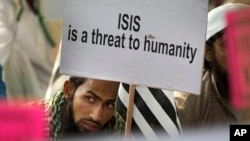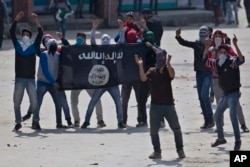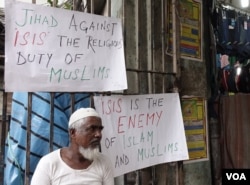For the first time the U.S. government is publicly warning of the possibility of terrorist attacks in India carried out by the Islamic State group.
A brief security message for U.S. citizens in India, issued Tuesday evening at the embassy in New Delhi, calls on Americans to "maintain a high level of vigilance and increase their security awareness," especially at religious sites, markets and festival venues.
Previous security advisories issued by the embassy have mentioned Islamic extremist groups, such as Indian Mujahideen (IM) and the Pakistan-based Lashkar-e-Tayyiba, but not Islamic State.
The fresh security advisory could be related to recent IS arrests in India, said Heritage Foundation senior research fellow Lisa Curtis, noting last month's discovery of an Islamic State cell in Kerala that allegedly was plotting attacks during the Diwali holiday season, which began Sunday and runs through Thursday.
"These arrests may have led to additional information about the ISIS terror threat in India," Curtis, a former CIA analyst who was also a diplomat in U.S. embassies in India and Pakistan, told VOA. ISIS is an acronym for Islamic State.
"I have no doubt there are some grassroots capability [of IS in India], at the very least," said Fred Burton, chief security officer for the private strategic intelligence firm Stratfor.
In other South Asian nations, such as Bangladesh and Pakistan, IS has successfully tapped into local Islamist networks.
"ISIS operators may be trying to employ the same tactic in India by linking up with groups like the Indian Mujahideen, which was behind a series of attacks several years ago," Curtis said. "ISIS released a recruiting video in May showing Indian Muslims [including two IM members] calling on Indian Muslims to avenge … purported injustices in Kashmir."
Muslim minority community
The relatively few extremists in India's substantial Muslim minority community are not perceived as having interest in joining IS, according to analysts. It has been reported that two or three dozen members of IM and others groups, however, traveled from India to Syria and Iraq to fight with IS, but are not believed to have sworn allegiance to the group's leader, Abu Bakr al-Baghdadi.
India traditionally has been more vulnerable to terror cells from Bangladesh and Pakistan carrying out attacks on its soil.
"Any kind of chatter can drive an alert" by a risk-averse State Department, Burton told VOA.
As has been the case for IS-claimed attacks in other parts of the world, there is "no need for elaborate infrastructure or training for a self-inspired small group or individual to do an 'official' Islamic State attack. Just at minimum a computer for inspiration, weaponry [including a machete or a vehicle]," added Burton, a former deputy chief of counterterrorism of the State Department's Diplomatic Security Service.
A branch of Islamic State said to be active in Afghanistan, Bangladesh and Pakistan has "an interest in galvanizing individuals to attack in India," said Amarnath Amarasingam, an analyst at George Washington University's Program on Extremism.
Possible nexus
Illinois State University's Ali Riaz, who teaches South Asian politics and political Islam, says Indian militants may be connected with terrorist groups in Bangladesh who have affiliated themselves with IS.
"Most of the weapons used in the recent Dhaka attack in July were modified in India before they were transported to Bangladesh," Riaz told VOA.
While the extremist group's messaging about India primarily has focused on the disputed Kashmir region and avenging attacks against Muslims in India, the group's magazine also has carried threats against Indian Prime Minister Narendra Modi, and condemned India for being a majority country of Hindus, a religion it has characterized as "cow-worshipping pagans."
Islam is India's second-largest religion, with Muslims comprising about 15 percent of the total population of more than 1.2 billion people.
If other countries follow Washington's lead and issue similar warnings about a possible IS attack, it may have ramifications for India's travel and tourism sector, according to the Economic Times, a Mumbai-based daily newspaper.
In recent years, foreign tourism has become a significant part of India's economy, contributing about $20 billion annually in foreign exchange earnings and matching the much-touted information technology sector.
VOA’s Noor Zahid contributed to this report.







